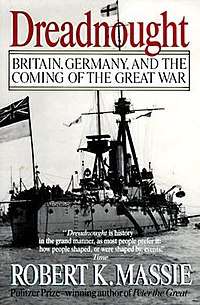Dreadnought (book)
Dreadnought: Britain, Germany, and the Coming of the Great War (1991) is a book by Robert K. Massie on the growing European tension in decades before World War I, especially the naval arms race between Britain and Germany. A sequel, covering the naval war between Germany and Britain, Castles of Steel: Britain, Germany, and the Winning of the Great War at Sea was published in 2004.
 | |
| Author | Robert K. Massie |
|---|---|
| Country | England |
| Language | English |
| Genre | Non-fiction |
| Publisher | Random House |
Publication date | 1991 |
| Media type | Print (hardback) |
| Pages | 1007 |
| ISBN | 0-394-52833-6 |
| OCLC | 23287851 |
| 940.3/11 20 | |
| LC Class | D517 .M37 1991 |
| Followed by | Castles of Steel: Britain, Germany, and the Winning of the Great War at Sea |
Summary
Massie begins with the birth of Queen Victoria and follows the chronology of the royal families of Europe, culminating in the unification of Germany by Bismarck and the crowning of Kaiser William I. With the stage set, Massie describes the series of people and events that contributed to the outbreak of war, including Alfred von Tirpitz and his plan for German naval superiority, the Kruger Telegram, Boer War and Boxer Rebellion.
HMS Dreadnought
While largely concerned with political and historic matters, a substantial chapter documents the design innovations incorporated into the namesake HMS Dreadnought warship and the interactions between Winston Churchill and Admiral of the Fleet Jackie Fisher that influenced its design and construction.
Table of contents
- Part I: The German Challenge
- Part II: The End of Splendid Isolation
- Part III: The Navy
- Part IV: Britain and Germany: Politics and Growing Tension, 1906–1910
- Part V: The Road to Armageddon
References
- Massie, Robert K. Dreadnought: Britain, Germany, and the Coming of the Great War. New York: Random House, 1991. ISBN 0-394-52833-6